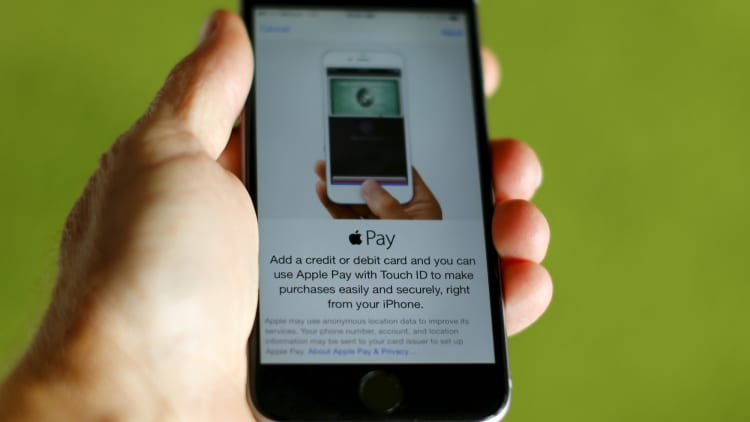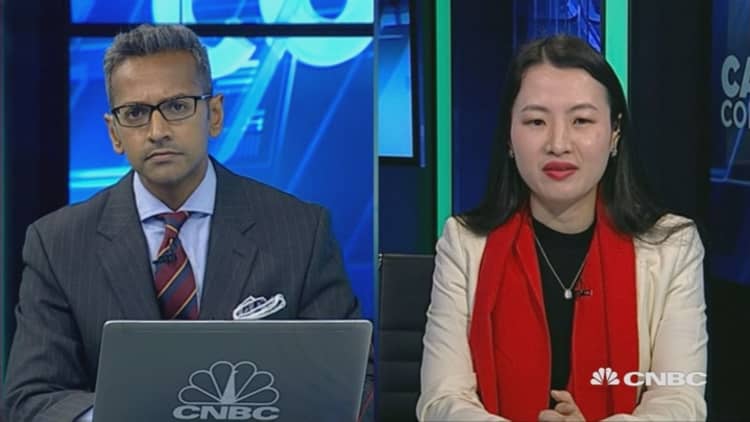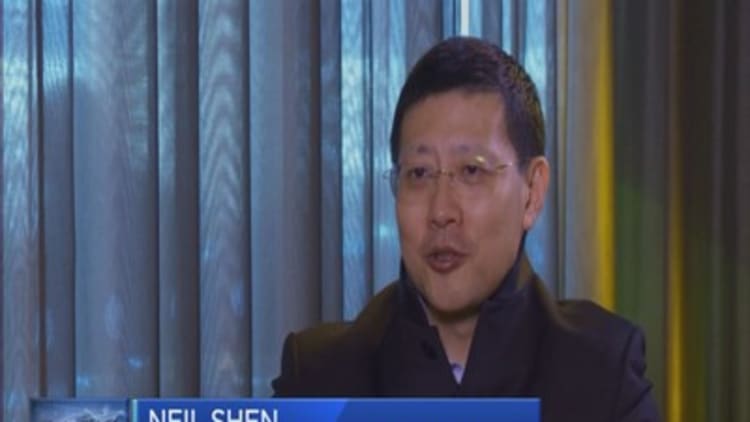Tencent would want to hope most WeChat users aren't like Cai Jiami.
The 31-year-old hastily transferred the balance in her WeChat "wallet" – roughly 7,000 yuan ($1070) – to her personal bank account before the Tencent-backed mobile messaging app could charge her for doing so.
"It's not a lot of money but I just don't like to be charged," Jiami, a wedding planner based in China's southwestern Chengdu city, told CNBC. "I have Alipay on my phone, which is free and working well. Why would I waste money on WeChat?"
From March 1 WeChat will charge users a fee of 0.1 percent when they transfer money from the app's built-in digital wallet to their personal bank account. According to an announcement by Tencent, the charge will be levied on withdrawals of more than 1,000 yuan ($153), with the minimum fee per transfer set at 0.1 yuan.
WeChat also said it would scrap an existing monthly charge on large cash transfers; it currently charges users a 0.1 percent fee on total monthly transfers in excess of 20,000 yuan ($3,058).
The new policies are an attempt to cover WeChat's banking costs, as well as to keep users' money in the WeChat Wallet, according to analysts.
A new money-spinner for Tencent?
China's mobile payment market has boomed in the past few years. Users have not only embraced the e-hongbao trend - exchanging digital red envelopes during Chinese New Year as greetings and gifts to friends and family - but also frequently transfer money or make payments to e-tailers as well as bricks-and-mortar stores by using services such as WeChat Pay.

About 516 million people made transfers during the recent Chinese New Year holiday, racking up 32.1 billion e-hongbao exchanges, according China's official Xinhua News Agency.
More broadly, the latest numbers available – for the third quarter of 2015 – showed that Chinese transferred 18.2 trillion yuan ($2.8 trillion) via mobile in just three months, according to China Internet Watch, a digital consulting company based in Singapore.
But the growing popularity of digital payments has proved costly for Tencent. The company acknowledged in its third-quart 2015 earnings report that it was paying "significant bank handling fees" on the money transfer service WeChat offered to its users largely for free.
Tencent did not reveal exactly how much it paid to banks, but the cost negatively impacted the company's gross margin, according to Cynthia Meng, managing director and head of China TMT equity research at Jefferies.
"The newly announced charge will in our view help to offset the burden somewhat," Meng told CNBC in an email interview. "[But] we don't believe that withdrawal fee will generate meaningful revenue for Tencent as the charge rate is minimal."
Pundits, including the Jefferies analyst, believe the new policy is unlikely to impact WeChat's market share, as most users have less than a few thousand yuan in their WeChat wallet.

According Tencent's financial report, the number of WeChat monthly active users reached 650 million in the third quarter last year. Tencent data showed that 93 percent of residents in tier-1 cities used the social app, while users in tier-2 and tier-3 cities are expected to grow rapidly in the next few years.
"WeChat users continue to use the payment tool because of convenience, user-friendliness and the scenarios offered within the WeChat Wallet," said Meng. "In our view, this will not change."
That said, there are other factors that could make expanding its payment system more difficult for WeChat - increasingly fierce competition for the same digital transactions.
The intensifying mobile war in China
Tech giants salivate over China's online and mobile payment market, which is big and growing rapidly; That 18.2 trillion yuan worth of mobile transactions undertaken in Q3 represented a year-on-year surge of 195 percent, according to China Internet Watch.
Growth is likely to be further fueled by the increasing numbers of Chinese buying smartphones. As it is, China makes up about 30 percent of the global smartphone market and the Chinese smartphone users is expected to jump from 519 million in 2014 to 704 million by 2018.
WeChat Wallet's biggest rival, Alibaba-backed Alipay, dominates the mobile payment industry with 400 million registered users and about 70 percent of China's third-party mobile payments. Wechat Pay is ranked the second, with a 19.2 percent market share.
In a sign of the heated rivalry, Alibaba does not allow the use of WeChat pay on its giant online sales sites, Taobao and T-mall, and Tencent does not allow Alipay to be used on the sites it backs.
After Tencent's announcement, Alipay said it would not follow suit to charge users for withdrawing cash.
But the market is getting increasingly crowded.
Apple and Samsung are both trying to break into China's mobile payment sector with partnerships with UnionPay, China's main bank card and payment firm; Apple Pay was launched in China on February 18 and Samsung Pay is expected to join the fray soon.
Unlike WeChat Pay and Alipay, which require users to scan QR codes generated by their apps in order to buy in an off-line store, Apple Pay users can complete purchases in shops via near-field communication (NFC) terminals, making it faster and more efficient than its domestic rivals.
"One word to describe the Apple Pay experience – fast," said Michael Lyu, a young professional based in Shenzhen. "I don't have to be directed to another app or page to pay, I don't have to type in the password, I don't even need a cellular or Wi-Fi network to pay."

Apple charges its partner Chinese banks 0.07 percent per transaction, just under half the sum Apple charges banks in the US, and does not charge users.
Shiny China prospects for Apple?
However, with the mobile payment feature only available on iPhones 6 models, plus low penetration of NFC terminals in China, analysts are concerned about Apple Pay's growth prospects.
"We [Jefferies] believe that the challenge remains how fast Union Pay can grow in the mobile payment space from its current low single digit mobile payment transaction market share," said Meng. "From both the merchant network, payment scenarios and user incentive perspective, there are some gaps to be filled, in our view."
Apple controls approximately 16 percent of China's smartphone market, according to research and advisory firm Gartner.
But despite investors' worries over iPhone sales in China as the country's economy slows, Apple Pay appeared to make a strong debut. Citing anonymous sources at UnionPay, Chinese local media reported that 38 million bank cards were linked to Apple Pay in the first 12 hours, equivalent to nearly half of Apple's iPhone 6 sales in China since 2014.
The winner? Chinese consumers
China's top five banks released a joint announcement on February 25, saying that they would waive fees for mobile transfers under 5,000 yuan ($764). The Industrial and Commercial Bank of China, Agricultural Bank of China, Bank of China, China Construction Bank and the Bank of Communications said the new policy would start on April 1, 2016. Together they have most of China's retail banking.
Chinese mobile users seem to welcome the intensifying race.
As a user called Antonio821 comments on Weibo, the Twitter-esque Chinese social media site, said recently, "More competition is always good."


